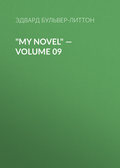
Эдвард Бульвер-Литтон
Falkland, Book 2
FROM ERASMUS FALKLAND, ESQ., TO THE HON. FREDERICK MONKTON
Write to me, Monkton—exhort me, admonish me, or forsake me for ever. I am happy yet wretched: I wander in the delirium of a fatal fever, in which I see dreams of a brighter life, but every one of them only brings me nearer to death. Day after day I have lingered here, until weeks have flown—and for what? Emily is not like the women of the world—virtue, honour, faith, are not to her the mere convenances of society. "There is no crime," said Lady A., "where there is concealment." Such can never be the creed of Emily Mandeville. She will not disguise guilt either in the levity of the world, or in the affectations of sentiment. She will be wretched, and for ever. I hold the destinies of her future life, and yet I am base enough to hesitate whether to save or destroy her. Oh, how fearful, how selfish, how degrading, is unlawful love!
You know my theoretical benevolence for everything that lives; you have often smiled at its vanity. I see now that you were right; for it seems to me almost superhuman virtue not to destroy the person who is dearest to me on earth.
I remember writing to you some weeks since that I would come to London Little did I know of the weakness of my own mind. I told her that I intended to depart. She turned pale—she trembled—but she did not speak. Those signs which should have hastened my departure have taken away the strength even to think of it.
I am here still! I go to E– every day. Sometimes we sit in silence; I dare not trust myself to speak. How dangerous are such moments! Ammutiscon lingue parlen l'alme.
Yesterday they left us alone. We had been conversing with Lady Margaret on indifferent subjects. There was a pause for some minutes. I looked up; Lady Margaret had left the room. The blood rushed into my cheek—my eyes met Emily's; I would have given worlds to have repeated with my lips what those eyes expressed. I could not even speak—I felt choked with contending emotions. There was not a breath stirring; I heard my very heart beat. A thunderbolt would have been a relief. Oh God! if there be a curse, it is to burn, swell, madden with feelings which you are doomed to conceal! This is, indeed, to be "a cannibal of one's own heart." [Bacon]
It was sunset. Emily was alone upon the lawn which sloped towards the lake, and the blue still waters beneath broke, at bright intervals, through the scattered and illuminated trees. She stood watching the sun sink with wistful and tearful eyes. Her soul was sad within her. The ivy which love first wreathes around his work had already faded away, and she now only saw the desolation of the ruin it concealed. Never more for her was that freshness of unwakened feeling which invests all things with a perpetual daybreak of sunshine, and incense, and dew. The heart may survive the decay or rupture of an innocent and lawful affection— "la marque reste, mais la blessure guerit"—but the love of darkness and guilt is branded in a character ineffaceable—eternal! The one is, like lightning, more likely to dazzle than to destroy, and, divine even in its danger, it makes holy what it sears; but the other is like that sure and deadly fire which fell upon the cities of old, graving in the barrenness of the desert it had wrought the record and perpetuation of a curse. A low and thrilling voice stole upon Emily's ear. She turned—Falkland stood beside her. "I felt restless and unhappy," he said, "and I came to seek you. If (writes one of the fathers) a guilty and wretched man could behold, though only for a few minutes, the countenance of an angel, the calm and glory which it wears would so sink into his heart, that he would pass at once over the gulf of gone years into his first unsullied state of purity and hope; perhaps I thought of that sentence when I came to you." "I know not," said Emily, with a deep blush at this address, which formed her only answer to the compliment it conveyed; "I know not why it is, but to me there is always something melancholy in this hour— something mournful in seeing the beautiful day die with all its pomp and music, its sunshine, and songs of birds."
"And yet," replied Falkland, "if I remember the time when my feelings were more in unison with yours (for at present external objects have lost for me much of their influence and attraction), the melancholy you perceive has in it a vague and ineffable sweetness not to be exchanged for more exhilarated spirits. The melancholy which arises from no cause within ourselves is like music—it enchants us in proportion to its effect upon our feelings. Perhaps its chief charm (though this it requires the contamination of after years before we can fathom and define) is in the purity of the sources it springs from. Our feelings can be but little sullied and worn while they can yet respond to the passionless and primal sympathies of Nature; and the sadness you speak of is so void of bitterness, so allied to the best and most delicious sensations we enjoy, that I should imagine the very happiness of Heaven partook rather of melancholy than mirth."
There was a pause of some moments. It was rarely that Falkland alluded even so slightly to the futurity of another world; and when he did, it was never in a careless and commonplace manner, but in a tone which sank deep into Emily's heart. "Look," she said, at length, "at that beautiful star! the first and brightest! I have often thought it was like the promise of life beyond the tomb—a pledge to us that, even in the depths of midnight, the earth shall have a light, unquenched and unquenchable, from Heaven!"
Emily turned to Falkland as she said this, and her countenance sparkled with the enthusiasm she felt. But his face was deadly pale. There went over it, like a cloud, an expression of changeful and unutterable thought; and then, passing suddenly away, it left his features calm and bright in all their noble and intellectual beauty. Her soul yearned to him, as she looked, with the tenderness of a sister.
They walked slowly towards the house. "I have frequently," said Emily, with some hesitation, "been surprised at the little enthusiasm you appear to possess even upon subjects where your conviction must be strong." "I have thought enthusiasm away!" replied Falkland; "it was the loss of hope which brought me reflection, and in reflection I forgot to feel. Would that I had not found it so easy to recall what I thought I had lost for ever!" Falkland's cheek changed as he said this, and Emily sighed faintly, for she felt his meaning. In him that allusion to his love had aroused a whole train of dangerous recollections; for Passion is the avalanche of the human heart—a single breath can dissolve it from its repose.
They remained silent; for Falkland would not trust himself to speak, till, when they reached the house, he faltered out his excuses for not entering, and departed. He turned towards his solitary home. The grounds at E– had been laid out in a classical and costly manner which contrasted forcibly with the wild and simple nature of the surrounding scenery. Even the short distance between Mr. Mandeville's house and L– wrought as distinct a change in the character of the country as any length of space could have effected. Falkland's ancient and ruinous abode, with its shattered arches and moss-grown parapets, was situated on a gentle declivity, and surrounded by dark elm and larch trees. It still retained some traces both of its former consequence, and of the perils to which that consequence had exposed it. A broad ditch, overgrown with weeds, indicated the remains of what once had been a moat; and huge rough stones, scattered around it, spoke of the outworks the fortification had anciently possessed, and the stout resistance they had made in "the Parliament Wars" to the sturdy followers of Ireton and Fairfax. The moon, that flatterer of decay, shed its rich and softening beauty over a spot which else had, indeed, been desolate and cheerless, and kissed into light the long and unwaving herbage which rose at intervals from the ruins, like the false parasites of fallen greatness. But for Falkland the scene had no interest or charm, and he turned with a careless and unheeding eye to his customary apartment. It was the only one in the house furnished with luxury, or even comfort. Large bookcases, inlaid with curious carvings in ivory; busts of the few public characters the world had ever produced worthy, in Falkland's estimation, of the homage of posterity; elaborately-wrought hangings from Flemish looms; and French fauteuils and sofas of rich damask, and massy gilding (relics of the magnificent days of Louis Quatorze), bespoke a costliness of design suited rather to Falkland's wealth than to the ordinary simplicity of his tastes.
A large writing-table was overspread with books in various languages, and upon the most opposite subjects. Letters and papers were scattered amongst them; Falkland turned carelessly over the latter. One of the epistolary communications was from Lord –, the —. He smiled bitterly, as he read the exaggerated compliments it contained, and saw to the bottom of the shallow artifice they were meant to conceal. He tossed the letter from him, and opened the scattered volumes, one after another, with that languid and sated feeling common to all men who have read deeply enough to feel how much they have learned, and how little they know. "We pass our lives," thought he, "in sowing what we are never to reap! We endeavour to erect a tower, which shall reach the heavens, in order to escape one curse, and lo! we are smitten by another! We would soar from a common evil, and from that moment we are divided by a separate language from our race! Learning, science, philosophy, the world of men and of imagination, I ransacked—and for what? I centred my happiness in wisdom. I looked upon the aims of others with a scornful and loathing eye. I held commune with those who have gone before me; I dwelt among the monuments of their minds, and made their records familiar to me as friends: I penetrated the womb of nature, and went with the secret elements to their home: I arraigned the stars before me, and learned the method and the mystery of their courses: I asked the tempest its bourn, and questioned the winds of their path. This was not sufficient to satisfy my thirst for knowledge, and I searched in this lower world of new sources to content it. Unseen and unsuspected, I saw and agitated the springs of the automaton that we call 'the Mind.' I found a clue for the labyrinth of human motives, and I surveyed the hearts of those around me as through a glass. Vanity of vanities! What have I acquired? I have separated myself from my kind, but not from those worst enemies, my passions! I have made a solitude of my soul, but I have not mocked it with the appellation of Peace.







